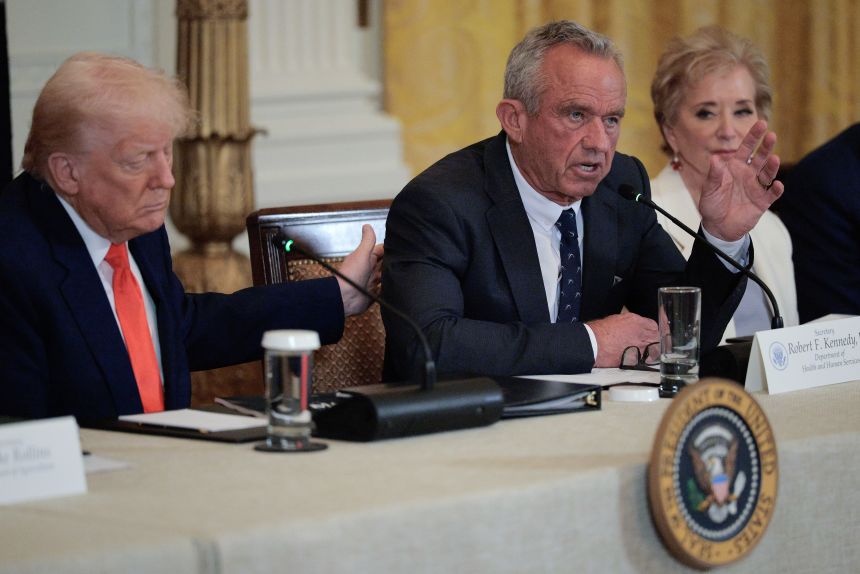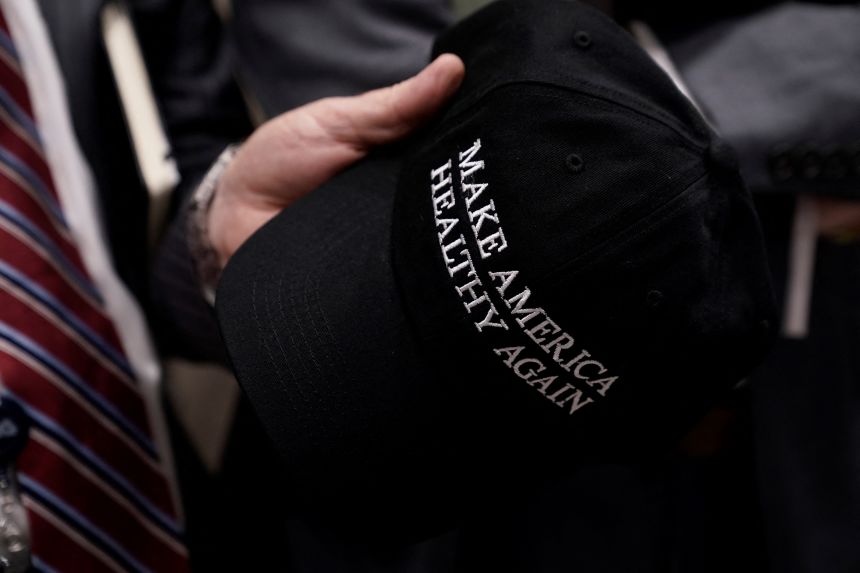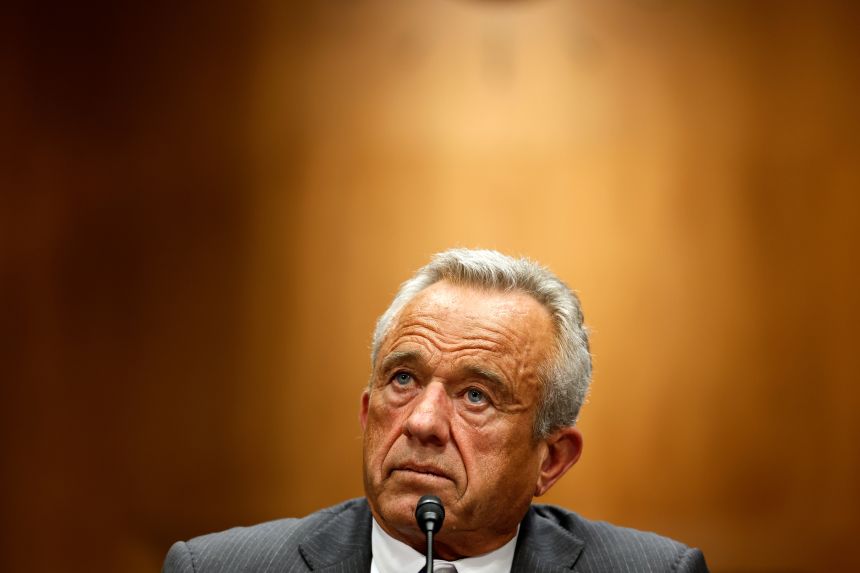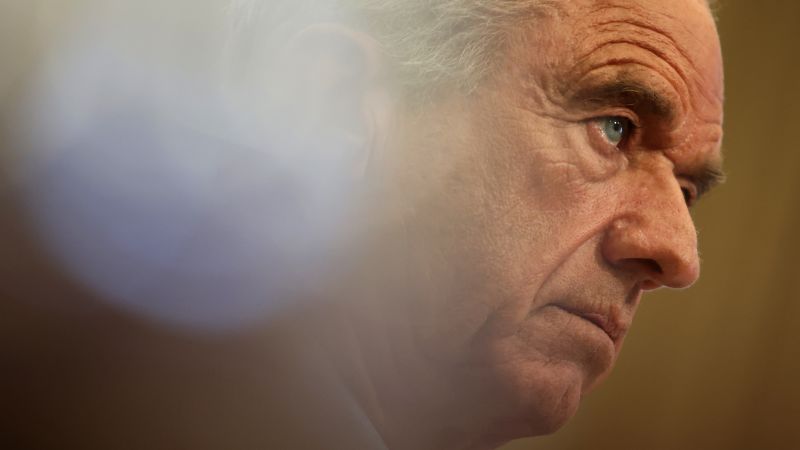Vaccines
Donald Trump
Respiratory viruses
Federal agencies
Tweet
Email
Link
Health and Human Services Secretary Robert Kennedy Jr. promised during his confirmation hearing that he’s not anti-vaccine.
But in another Senate hearing Thursday he will have to answer for a series of dramatic steps that cast doubt on his word — and threaten to destroy health protections that have saved millions of lives.
Since becoming America’s top health official, Kennedy has purged top government vaccine experts, fired the director of the Centers for Disease Control and Prevention and terminated research on some lifesaving vaccines.
The national pro-vaccine consensus that has improved life expectancy over generations has splintered. On Wednesday, for example, Florida moved to end constitutionally upheld vaccine requirements for school kids and three Democratic-run states banded together to offer public health guidelines, reasoning that federal bodies once seen as a global gold standard could no longer be trusted.
Already, the consequences for the health of Americans look enormous.
Thursday’s Senate Finance Committee hearing will be an early test of whether the nation’s sharply divided politics will bear Kennedy’s radical policy changes and of the strength of President Donald Trump’s support for the lightning rod HHS chief. Democrats will try to begin a process of making Kennedy politically radioactive to punish Trump for picking him.
Committee Republicans face a choice between supporting Kennedy’s actions, some of which are popular with their party’s base, and spurning decades of proven scientific research.
The spotlight will be especially bright on Louisiana Sen. Bill Cassidy, a physician who, wearing his other hat as chair of the Senate Health, Education, Labor and Pensions Committee, helped secure Kennedy’s confirmation and said he’d secured assurances that Kennedy’s anti-vaxxer past would not translate into policy.
Cassidy, who faces a GOP primary in his 2026 reelection bid, could be torn between a desire not to anger Trump and a medical professional’s reverence for science. The two-term Louisiana senator declined to tell CNN’s Manu Raju this week whether he regrets his vote to confirm Kennedy or whether he trusts him.
Democrats have demanded Kennedy’s resignation over purges of CDC leaders. Vermont independent Sen. Bernie Sanders, a Finance Committee member, warned last week that history will not look kindly on those who fail to stop RFK Jr.’s “dangerous anti-vaccine crusade.”
Kennedy has become the most urgent example of how Trump’s attempts to dismantle pillars of the establishment — in this case, the public health system — could deeply change the country, potentially in dangerous ways.

Former top CDC officials warn that RFK Jr. is already destroying infrastructure that has saved millions of lives with his anti-scientific ideas that suit Trump’s political ambitions.
But in the short term, their high-profile warnings can be a political plus for Trump. His insurgent political project relies on making bureaucrats and elite luminaries squeal and forcing Democrats to defend institutions that many Americans believe have let them down.
Access to vaccines, however, is a matter of life and death. Former subordinates say Kennedy is spurning the science-based expertise of government scientists as he swings at critical institutions and protocols. Their warnings show that more serious consequences are at play than Trump’s immediate political prospects.
A group of former CDC directors or acting directors warned in a New York Times op-ed Monday that Kennedy was endangering every American’s health after he fired the recently confirmed CDC Director Dr. Susan Monarez last week over differences in vaccine policy and her refusal to dismiss staff. They warned that his actions were “unlike anything our country had ever experienced.”
One of their number, Dr. Tom Frieden, said on CNN’s “Inside Politics” Sunday that Kennedy and Trump were on a mission to deny, distract and destroy, on vaccines and by dismantling other health protections. “We are less safe,” Frieden said.
A coalition of health industry groups, including the Infectious Diseases Society of America, the American Public Health Association and the American Association of Immunologists, joined many current and former HHS employees on Wednesday in demanding Kennedy’s resignation, warning that forcing CDC experts to “turn their back on decades of sound science” makes “Americans less safe in a multitude of ways.”
But in a Wall Street Journal op-ed, RFK Jr. claimed to be restoring public confidence in the CDC. “Bureaucratic inertia, politicized science and mission creep have corroded that purpose and squandered public trust,” he wrote.
Kennedy argued the CDC’s actions have been neither “pro-vax” nor “anti-vax” but instead apply what he calls “gold standard” science. But in comments that will set alarm bells ringing, he said Americans elected Trump — who has no medical qualifications and who promoted debunked Covid-19 remedies — to set health policy. And he hinted about alleged links between vaccines and antibiotics to chronic diseases that experts reject.

Kennedy’s ascent to running American public health was on the result of a confluence of political forces. His split from the Democrats and his independent political run for president made him a natural ally for Trump, whom he endorsed in 2024. Kennedy’s anti-vaccine past was also a good fit for the times, as he won approval from Trump’s voters over his condemnation of measures used by government public health officials to try to protect Americans during the Covid-19 pandemic.
During dark months in 2020, prolonged school closures, advice on masking, the temporary shuttering of the economy and social distancing clashed with the individualist streak among many Americans and became a rallying call for conservative politicians.
In retrospect, some of the recommendations of senior officials who were learning about a novel coronavirus as they went along seem misguided. And some voters balked at what they viewed as the imperious tone of some officials, fueling an existing skepticism among Trump supporters about experts and people they see as liberal elites.
The skepticism of US public health institutions cannot be underestimated among Trump voters and is widespread on social media.
RFK Jr. probably would never have reached HHS but for the pandemic. His decisions appear refracted through his long-held unorthodox theories, openness to medical industry dissenters, a selective reading of science, and views that commonly used vaccines are in some cases not safe or were not properly tested.
He’s therefore politically useful to Trump because he taps into anti-elite anger and the lasting effects of the pandemic on politics.
Kennedy’s campaign to “Make America Healthy Again” by lessening reliance on processed foods, stressing exercise and eliminating additives like food dyes enjoys more support across the medical community than his vaccine heresy. Crucially, it is also popular with a coalition of voters, from suburban moms to independents, who might otherwise not be available to the president. This bloc could be critical in close races in next year’s midterm elections if Republican turnout is depressed without Trump on the ballot.
Still, there is growing evidence that while Kennedy is popular in Trump’s cohort of voters, radical attempts to restrict vaccines could prove broadly unpopular, as CNN’s Aaron Blake reported Wednesday.

Aside from Thursday’s hearing, Kennedy’s impact on the nation’s health will grow imminently. He has promised Trump information this month on the causes of autism, after having spent years pushing claims — discredited by multiple scientific investigations — of a link between the condition and childhood inoculations. The confirmation process of a new permanent CDC chief is likely to be a flashpoint moment that will show whether GOP senators have the chops to safeguard public heath when doing so would require a break with their grudge-bearing president.
The first deliberations of the CDC’s new Advisory Committee on Immunization Practices will be closely watched. The panel of independent experts has huge power to reshape American health care, since its recommendations influence what vaccinations insurance companies and programs like Medicaid will cover. Kennedy fired all 17 members of the panel in June and chose some replacements who shared his vaccine skepticism.
Cassidy said in supporting Kennedy’s confirmation vote that the future HHS secretary had pledged to “work within the current vaccine approval and safety monitoring systems” and to maintain the vaccine advisory committee “without changes.” Cassidy has called for the next meeting of the CDC advisory committee to be postponed until “significant oversight has been conducted.”
Kennedy has also taken other steps to curtail the availability of vaccines. Last week, the administration narrowed access to the latest version of the Covid-19 vaccine. Kennedy has also terminated federal funding for mRNA vaccines — a category of therapies that ended the Covid-19 emergency and would allow for the swift development of new treatments in the event of a new pandemic. This is in addition to billions of dollars in halted research and development as part of Trump’s assault on elite universities, which has hampered research on diseases like cancer and Alzheimer’s
Trump wants credit for the Covid-19 vaccines he slanders
Trump exemplifies the fault line between conservative politics and medical research. In recent weeks he’s publicly complained about this inability to fully benefit politically from one of the legacy achievements of his first term — the Operation Warp Speed drive toward a Covid-19 vaccine.
On Truth Social, Trump simultaneously lauded the vaccines and raised doubts about their credibility. He demanded drug companies justify their success, claiming the CDC was being “ripped apart” over the issue. “Many people think they are a miracle that saved Millions of lives. Others disagree!” he wrote.
Multiple studies have shown the vaccines did indeed save millions of lives. Pfizer responded to Trump with a list of 200 news releases and statements and 27 peer-reviewed data publications proving the point — and fellow vaccine makers Moderna and Novavax shared their own thorough lists of data on safety and effectiveness.
The administration’s constant raising of doubt about vaccines can be hugely damaging. Several recent measles outbreaks have shown the danger of even a relatively small decline in vaccination rates. RFK Jr. showed some support for measles vaccines but also called them a “personal” choice.
A wider political turn against vaccines could be very damaging. Florida’s attempt to end school vaccine requirements, for instance, could not only endanger kids who don’t get their injections, but also expose people who are too young or vulnerable to get the vaccinations to diseases such as polio, measles or tetanus.
Florida’s Surgeon General Dr. Joseph Ladapo said Wednesday that the decision, which could lead to similar moves from other conservative states, was intended to eradicate what he referred to as “mandates.” He said the setting of vaccine schedules “is wrong and drips with disdain and slavery.”
This justification of changes on political rather than evidential grounds is characteristic of the populist conservatism epitomized by Trump.
On many issues, there’s little immediate price for Trump’s disruption. It’s hard to quantify the impact of firing experts at the Department of Education, for example. And most Americans will never see the effect of eradicating the US Agency for International Development on HIV/AIDS rates in Africa.
But the consequences of the assault on US public health protocols led by RFK Jr., one of Trump’s most shocking Cabinet picks, may soon be painfully obvious.

